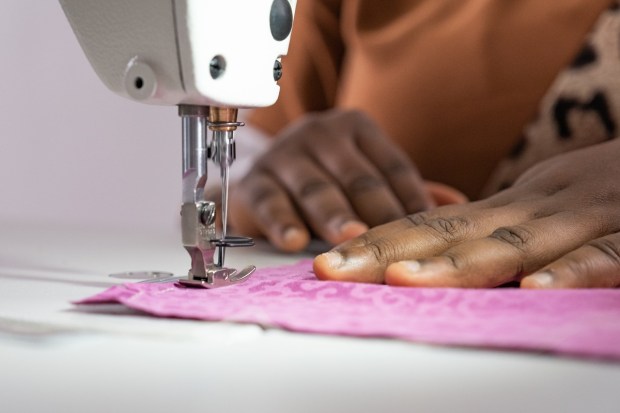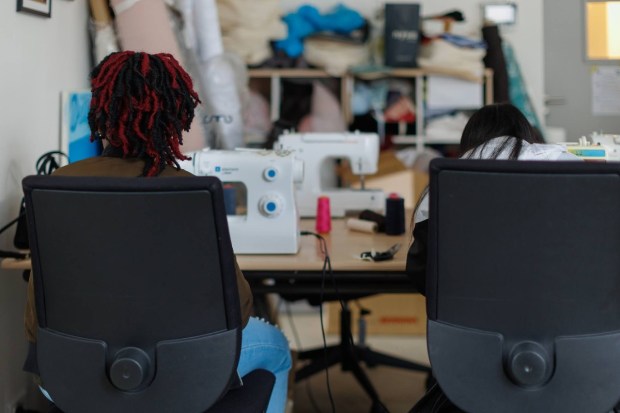Atelier Bakhita is a unique place for many women who are or have been involved in prostitution. It's a haven of peace that gives them back a taste for fraternity, beauty, working with their hands—in a word, for life.
Housed in Maison Bakhita (Bakhita Home), created by the Diocese of Paris in September 2021 to promote the integration of migrants, Atelier Bakhita extends over 850 square feet on Rue Jean Cottin, Paris (18th arrondissement). From Monday to Thursday, 9am to 4pm, eight women—the vast majority Nigerian—meet to sew. They work under the guidance of a workshop manager who trains them, accompanies them, and manages production. Since 2021, this growing production has specialized in wedding attire for children in wedding processions (such as flower girls).
When it was begun in 2017 by Aux Captifs, la libération (“Liberation to Captives”) association, Atelier Bakhita enabled women to learn to sew for themselves. The workshop started offering sewing activities as part of a wider offering to help women in prostitution to discover new opportunities in life. Little by little, it transitioned to offering them actual employment. These new seamstresses respond to orders, sell their creations, and are paid for their work. It benefits from a special kind of legal status for organizations that enable people seeking reintegration into society and the workforce to take part in supervised activities.
Loading
Recognition for their work
Since 2021, Atelier Bakhita has begun specializing in clothing for children in wedding processions. It’s "a way of creating beautiful things, be they dresses, Bermuda shorts, belts, pussybows, ties..., and recognizing the value of the seamstresses' work," explains Florence de Dreux-Brézé, head of Atelier Bakhita and Atelier Bosco, which specializes in building painting.
"The seamstresses are proud to make attire for children in wedding processions. They’re congratulated by the bride and groom, the members of the wedding party are photographed by professionals, and the photos are exhibited in the workshop, which is very gratifying.”
The seamstresses don't just learn sewing techniques and theories; they create outfits for special days, in precious and beautiful fabrics. In particular, they work with L'Enfant Roi, which supplies children's patterns that the workshop adapts according to the client's wishes.
High demand for wedding processions
The wedding procession attire business is booming. By summer 2021, Atelier Bakhita had completed clothing for three weddings. In 2022, no fewer than 24 brides used their services. The year 2023 is also shaped up nicely, with around twenty orders for weddings that were no longer confined to the summer, but even extended into the winter season. "There are very few associations that offer the creation of clothes for wedding parties with a strong social impact," says Florence de Dreux-Brézé, explaining the reasons for such success.
Loading
The association's links with parishes also play an important role. "At Aux Captifs, liberation is rooted in parish and diocesan life, and in parishes, people get married! We relied on the parishes to support us, and word-of-mouth did the rest. The wedding processions enjoy great visibility, and brides and grooms recommend us... People are genuinely sensitive to the project."
Personal fulfillment
In addition to creating attire for a beautiful wedding procession, the seamstresses also achieve personal fulfillment. The best proof of this? Most of the women stay after 4 p.m. to sew their own clothes.
This gesture is far from insignificant. After all, they've all been in prostitution, or are trying to get out of it. "Their relationship with their body and with clothing is eminently complex," emphasizes Florence de Dreux-Brézé.
"Here, they dress in every sense of the word. They create themselves, fulfill themselves, discover something they love to do. At the Atelier, their body is no longer instrumentalized or abused. Appreciated and exalted, it becomes a bearer of beauty. It’s a unique experience for women who are often victims of human trafficking.”

There's no talk of prostitution here. "The women who come are seamstresses, and we don't know their background," says the manager. Nevertheless, the seamstresses are all known to Aux Captifs, la libération.
Each seamstress is kept track of by a social worker in one of the association's branches. So, in parallel with the workshop, the seamstresses continue to receive social support and take part in the association's other activities: prayers, French lessons, outings, temporary and permanent housing...
A place to live
Seamstresses stay at the workshop for an average of 18 months. The benefits are innumerable: self-confidence, self-esteem, friendships, discovery of beauty, work well done, self-discipline, perseverance…
"I'm impressed by the impact of the workshop. I'm impressed by the impact of beauty on dressmakers," says Florence de Dreux-Brézé. "Wedding procession attire is beautiful, and wedding photos are beautiful. The seamstresses feel an immense sense of pride, realizing that they are capable of making beautiful things."
The manager also testifies to the autonomy that each of these increasingly alert and skilled seamstresses is developing. Each has her own tools and considers herself a professional.

Last but not least, Atelier Bakhita is also a place where they forge strong bonds of friendship. Friday is a "community day,” in conjunction with Atelier Bosco. It’s a day to get together and bond, away from the hustle and bustle of the street.
The women are invited to make the Maison Bakhita their own, and it's not for nothing that it's called a maison ("home"). As one of the seamstresses recently told us, "Before, I used to go out into the street to be with people, but now that I have the workshop, I don't have to."
The sewing workshop and home are under the patronage of St. Josephine Bakhita, a young Sudanese slave who became the master of her own life. She’s a powerful saint to accompany, watch over, and encourage the seamstresses in their social and professional integration.










